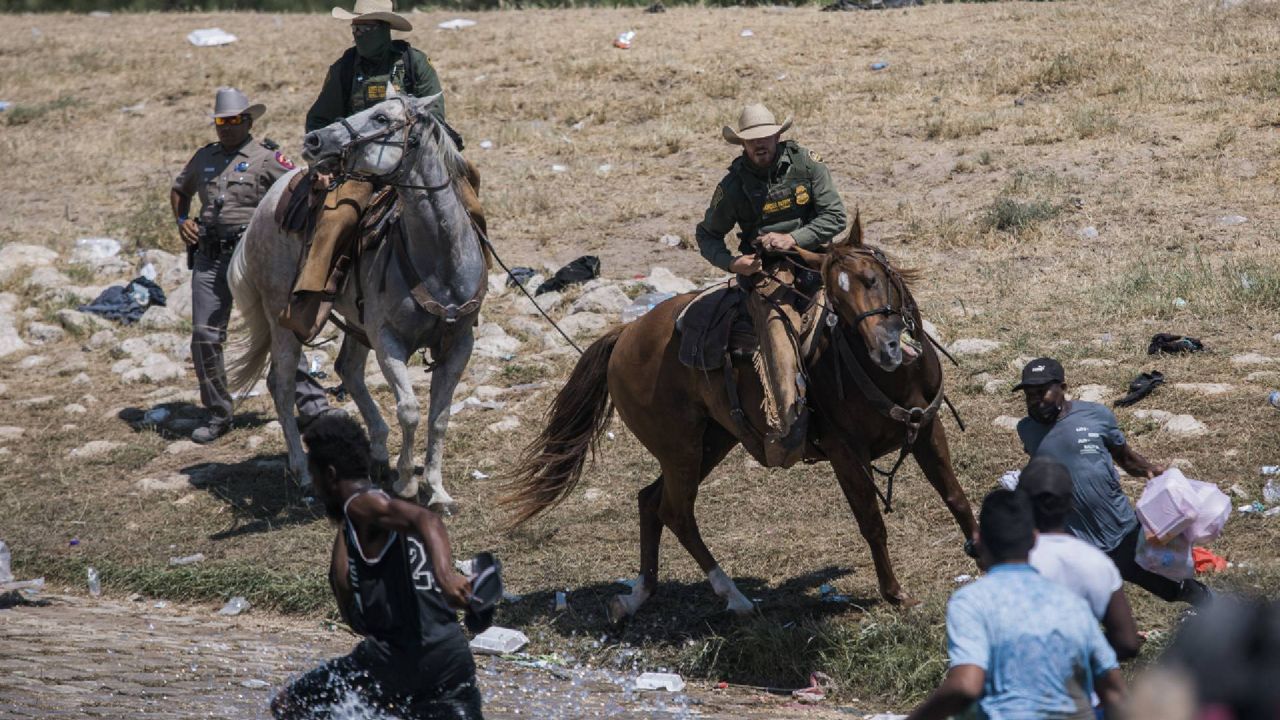The White House on Monday responded to images taken outside Del Rio, Texas, over the weekend of Border Patrol agents on horseback, appearing to try and push back Haitian people with whip-like cords as the U.S. seeks to deport thousands of those migrants from the area in the coming days.
The White House press secretary Jen Psaki called the images “horrific” and “horrible to watch” but did not commit to any action against those agents, adding that she needs more context before saying more.
The photos and videos of the agents on horseback were taken as the U.S. began a mass deportation of Haitian migrants after more than 10,000 gathered under a bridge near the border crossing outside Del Rio late last week. At least a dozen flights were scheduled as of Monday.
Though the border in that area is now closed, some Haitians returned to Mexico by river and crossed back and forth to bring food and water to the tent camp on the U.S. side.
Psaki reiterated that point Tuesday in an interview with "CBS Mornings," and referred to an investigation being launched by the Department of Homeland Security into the matter.
“This is not who we are," Psaki told "CBS Mornings" anchor Tony Dokoupil. "That’s not who the Biden-Harris administration is, and we're gonna absolutely pursue that investigation and get to the bottom of what happened."
That is where border agents tried to turn them back, some of them on horseback and appearing to strike out at the migrants with long cords, as detailed by a Washington Post interview with one photographer who witnessed the events and took a photo of an agent pulling one man by his shirt.
Homeland Security Secretary Alejandro Mayorkas on Monday said those cords may not be whips but part of the horse’s long reins.
Mayorkas told CNN on Tuesday that those images "horrified" him, saying that "any mistreatment or abuse of a migrant is unacceptable."
"I was horrified by what I saw," Mayorkas told CNN. "I'm going to let the investigation run its course. But the pictures that I observed troubled me profoundly. That defies all of the values that we seek to instill in our people."
Mayorkas pledged to investigate the situation and would address the situation "with full force" after the investigation is complete.
The DHS secretary called the migrant situation a "heartbreaking situation" and a "tremendous challenge," but stopped short of calling it a crisis.
"I, by no means, diminish the humane issue that it presents, but I want to be clear that we do have a plan to address it, respecting the needs of the individuals and we are executing on that plan," Mayorkas added.
“The horse patrol units down here are going to play an integral part in the security response,” U.S. Border Patrol Chief Raul Ortiz added, noting that they were also trying to block smugglers from crossing into the U.S. “We will certainly look into the matter.”
Psaki said the White House was also looking for more information about the context surrounding the photos.
“It's horrible to watch. I just have to get more information,” she said. “I can't imagine what the scenario is where that would be appropriate. I'm certainly not suggesting that.”
The Del Rio camp is made up of mostly Haitians, some who said the recent devastating earthquake in Haiti and the assassination of President Jovenel Moïse make them afraid to return to a country that seems more unstable than when they left.
“In Haiti, there is no security,” said Fabricio Jean, a 38-year-old Haitian who arrived in Texas with his wife and two daughters. “The country is in a political crisis.”
Psaki on Monday said the U.S. was looking at ways to provide money to Haiti as the country recovers from the earthquake, as well as keep existing immigration pathways in place, including the Temporary Protected Status designation available to Haitians.
“Now is not the time to come for a range of reasons,” she said.
The Associated Press contributed to this report.



